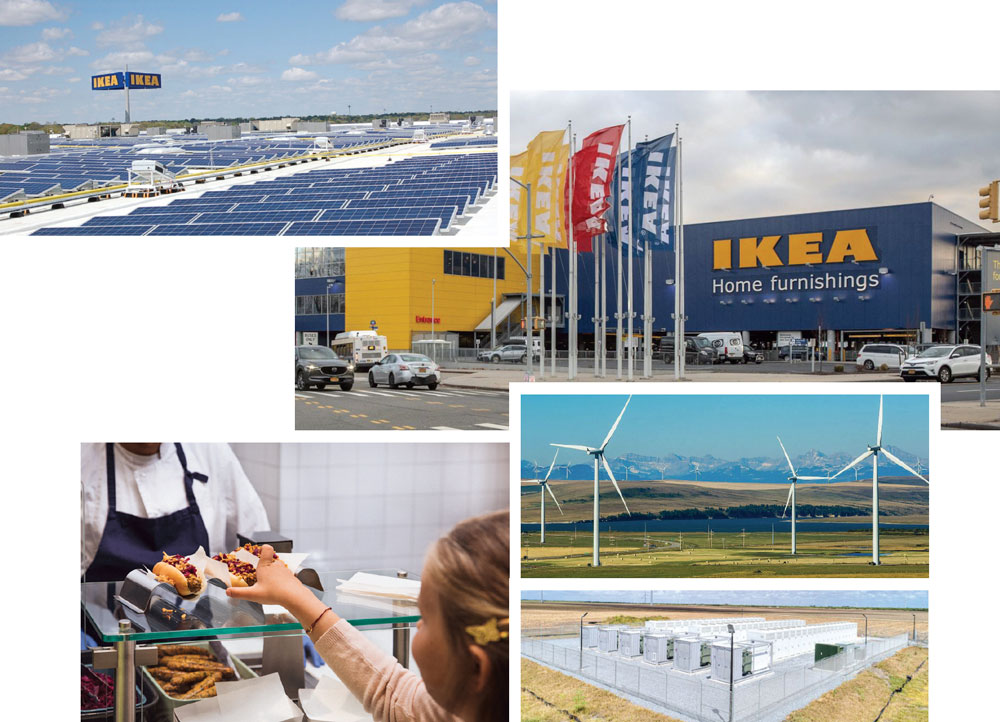Interview with Lindsey Craig
Iconic retailer commits to using renewable or recycled materials and designing products to be reused,
refurbished,
re-manufactured, and eventually recycled.

Furniture World spoke to Lindsey Craig, a sustainability business partner at IKEA U.S. who leads the circular
and
climate-positive pillar of the IKEA sustainability strategy. “I joined the team about a year and a half ago and
have
helped lead initiatives such as integrating electric vehicle chargers across IKEA U.S. stores, championing Zero
Waste to
Landfill initiatives and biodiversity conservation,” she said. “I earned a BS in Environmental Science at the
University
of Delaware and a Master of Science in Environmental Planning and Management from Johns Hopkins University.”
Sustainable Decision-Making
When asked how IKEA chooses its sustainable investment decisions, Craig replied, “We make our decisions based on
a
combination of factors, such as how an initiative will support our overarching sustainability strategy and
goals,
customer feedback, research on industry trends and regulatory requirements. We’ve found that inspiration can
come from
anywhere. In fact, the idea for the Buy Back & Resell program was spurred by one of our global ONE HOME, ONE
PLANET
events.”
“IKEA has integrated sustainability metrics into investment requests,” she continued, “which helps ensure that
all
projects are viewed through a more holistic lens, beyond just return on investment. Carbon emissions, waste
reduction,
and community impact are integral to the larger decision-making process.”

Climate positive page from IKEA’s 2023 Annual Summary Report. Lindsey Craig (above) leads the circular and
climate-positive pillar of the IKEA sustainability strategy.
While most home furnishings retailers have worked to move their operations incrementally toward sustainability
by
installing LED lighting, recycling packaging materials and optimizing delivery routing, IKEA has gone further.
In 2023,
the company reported that it generated more renewable energy than the company as a whole consumed.”
IKEA takes care in quantifying its sustainable milestones; Craig provided some highlights, which were also
reported in
its 2023 Annual Summary Report.
- 213,863 solar panels produced 52,818,638 kWh of energy.
- 104 wind turbines produced 702,365,352 kWh of energy.
- 171,701 acres of responsibly managed forests.
- Seven fuel cell arrays produced 9,438,488 kWh of energy.
- Two geothermal systems.
- 171,836 zero-emission deliveries.
- 322 EV (electric vehicle) charging stations across 54 properties.
- 2,101,217 LED bulbs sold.
-
In September 2023, IKEA U.S. announced a new solar installation across seven IKEA units and a large-scale
renewable
heating and cooling project to optimize existing HVAC systems at five stores.
-
IKEA worked with Apex Clean Energy on our first-ever battery storage project. The standalone lithium-ion
battery is in
Cameron County and supports the Texas power grid.
Getting to Climate Positive
IKEA has a goal to become climate-positive by 2030. “We are on a mission to help create a better future for
people and
the planet,” Craig explained. “We recognize that, as a company with a large reach, customer base and
environmental
footprint, we need to do everything we can to reduce our impact on the planet. Several other sustainability
programs and
initiatives are helping us achieve our goals. These include:
Buy Back & Resell: “IKEA’s Buy Back & Resell service—where we buy back IKEA Family members’ gently used IKEA
furniture
in exchange for store credit—is offered year-round at nearly every store in the U.S. These products then go to
the As-is
section at almost all IKEA U.S. locations, where customers can give these products a second life. In the spring
of 2023,
IKEA announced that IKEA Family members can also shop As-is products online – a perk that comes with our free
IKEA
Family membership providing customers with sustainable furniture options while also extending the life of our
products.
“Further,” Craig noted, “our stores’ “Sustainable Living Shops” feature all sorts of products to showcase how
clever
designs, materials, and behaviors can help create a better and more sustainable life at home. Our customers
might find
an ‘As-is’ product integrated into one of our iconic room settings!”
“IKEA’s Buy Back & Resell service—where we buy back IKEA Family members’ gently used IKEA furniture in
exchange for
store credit—is offered year-round at nearly every store in the U.S.”
Spare Parts: “Additionally, our spare parts program allows customers to order small parts, like screws and
hinges, to
enhance the longevity of their furniture, which is great for both their wallets and the planet.”
Fast Chargers: “We plan to install 500 public fast chargers and over 300 fleet chargers in the coming years at
IKEA’s
U.S. store locations.”
Electricity Generation: “In 2023, we launched solar installation projects (solar car parks and battery energy
storage
systems) at our stores nationwide. Additionally, IKEA implemented a large-scale renewable heating and cooling
project to
help eliminate fossil fuels from our operations.”
Zero-Emission Deliveries: “IKEA currently makes zero-emission last-mile deliveries in New York City, Los Angeles
and 16
other markets, with more to come.”
One Home, One Planet Event: “Every other year, we host ONE HOME, ONE PLANET, an action-oriented event that
brings
together purpose-driven, idea-led doers, thinkers, and influencers from across different sustainability fields
to create
actionable change.”
Home Solar Power: “Beyond using sustainable power sources in our business operations, we’re passionate about
helping our
customers to live more sustainable lives at home,” Craig explained. “In the fall of 2022, we proudly partnered
with
SunPower Corp. to make solar energy more accessible to customers, enabling them to make individual choices to
reduce
their overall climate footprint. Now, IKEA Family members can purchase home solar solutions that help generate
and store
their renewable energy.”
Meatballs: The IKEA brand image is closely linked to serving and selling meatballs. In the March/April edition
of
Furniture World, architect and store designer Jennifer Magee wrote in her “Store Design: Retail
Entertainment?” feature
that IKEA was “one of the first furniture stores that put food at the heart of their store experience. IKEA’s
budget-friendly Swedish meatballs became a signature dish people trekked to the store to enjoy. The focus of
their
cafeteria on providing hot meals combined with an intricate ‘maze’ of room set displays, keeps customers in
stores all
day, making them shopping destinations (see https://www.furninfo.com/authors/jennifer-magee/86).”
IKEA sells a lot of meatballs— 54,598,704 were sold in restaurants across IKEA U.S. locations in 2023. It’s
hardly a
sustainable product offering. The EPA estimates that “1.5 billion cattle, raised specifically for meat
production
worldwide, emit at least 231 billion pounds of methane into the atmosphere each year. But Craig notes that IKEA
offers
“a variety of healthy and more sustainable food choices. IKEA sold 4,591,340 plant balls in 2023, and we just
welcomed
the newest plant-based food item, the plant dog, to the IKEA Food family.” It’s a significant, sustainable start
toward
changing hearts and perhaps meatball consumption preferences.
Goal: Full Circularity by 2030
Although a leader in many areas of sustainable retail, traditionally, IKEA hasn’t been known for selling
furniture that
will last for generations. A quick Google search also reveals that the brand has been associated with the
pejorative
designation “fast furniture,” a shorthand for furniture likely to end up in landfills. It appears that IKEA’s
sustainable initiatives have eased the perception and the reality of the company’s climate impact.
“We are on a mission to help create a better future for people and the planet... Now, IKEA Family
members can purchase
home solar solutions that help generate and store their renewable energy.”
When asked what role she sees furniture retailers playing in circularity in the next 5 to 10 years, Craig
replied,
“Although we still have a long way to go until the industry is fully circular, the next 5 to 10 years will be
crucial as
we face the rising demand for low-cost and circular products. We’re seeing that more and more companies are
starting to
recognize the demand for sustainable and circular solutions, and the furniture industry is no exception.
“At IKEA, we aim to achieve full circularity by 2030. Last year, we hosted a small, closed-door ONE HOME, ONE
PLANET
roundtable that brought together leaders and sustainability experts to brainstorm and share best practices for
creating
a circular economy in our industry.
“As a home furnishing brand, IKEA understands our role in ensuring that products are sourced, manufactured, and
distributed sustainably and equitably. That’s why we are committed to using renewable or recycled materials and
designing products to be reused, refurbished, re-manufactured, and eventually—after all other possibilities have
been
explored—recycled.”
Conclusion
In closing, Craig advised Furniture World readers that “climate change is unavoidable, and the urgency to act
now is
clear. At IKEA, we have a unique opportunity to set a good example to impact people, society, and the planet.
Everyone
must work together to build actionable change. I am proud of what IKEA has accomplished so far to create a
better
everyday life for many people, and we are excited to work towards the next steps in our journey!”